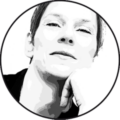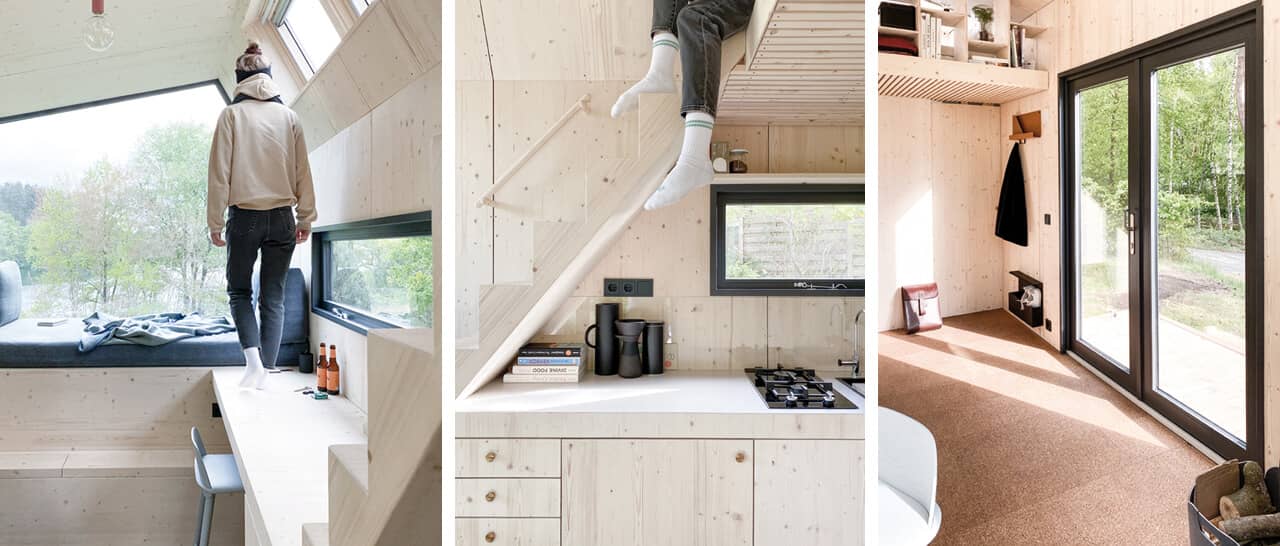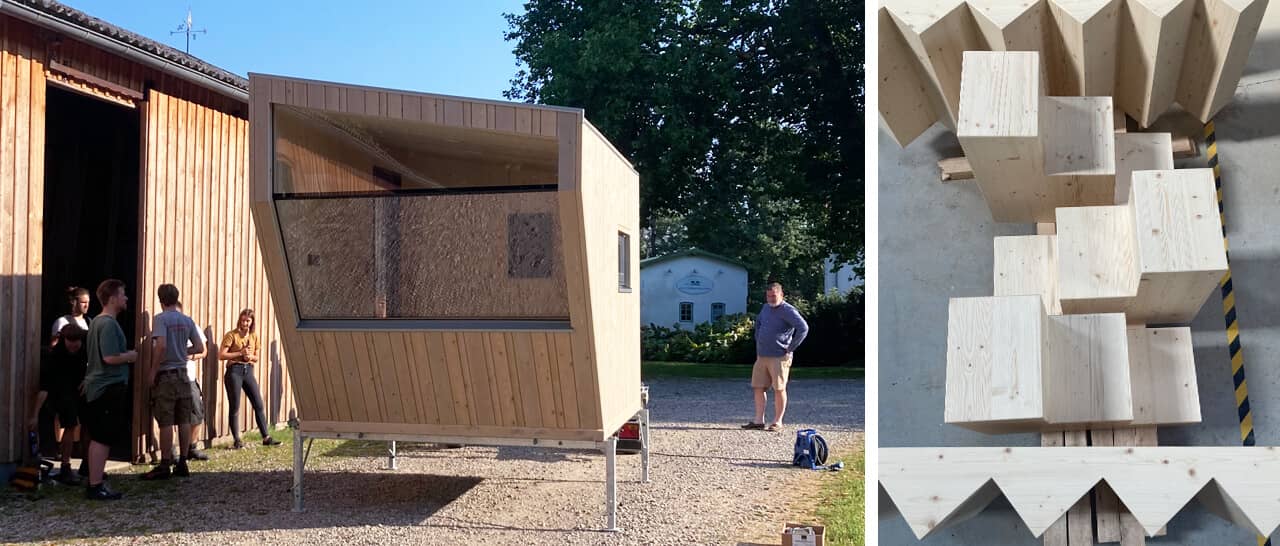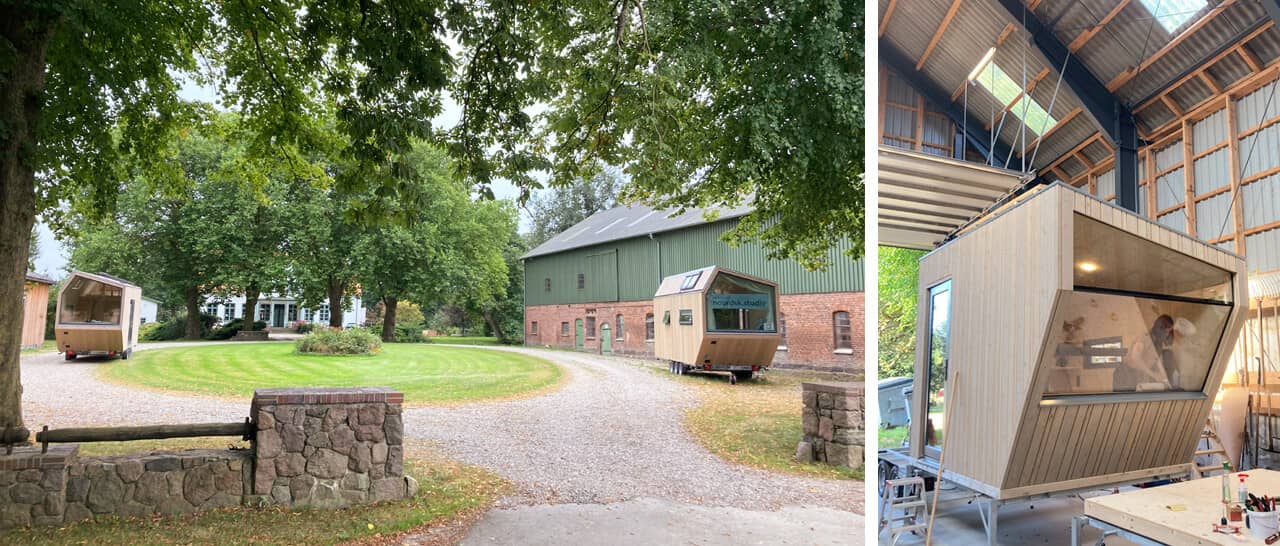- Coffee with
“I am just gonna do it. I believe in it.”

Barbara Beiertz
Felix rented a little farm in Stürsholz in Angeln from ‘Aktion Kulturland’, moved his office, his belongings and himself there, and placed KAAT, the prototype of his tiny house, in the yard, which he rents out for short getaways or longer vacations.
Many associate tiny houses with climate saving and the ultimate solution for any kind of housing problems. Which is indeed an interesting topic, but goes beyond the scope of this article. So, I ask him what it takes to put an idea into action and how to avoid selling your soul for success. Super fascinating. And exciting, to finally have a “live” coffee again, especially with someone who is such a coffee nerd as Felix (also a Mount Hagen fan). So, he takes his time brewing the Demeter Single Origin from Peru that I brought. While I cuddle the dog…
B: Felix, do you mind explaining in a few sentences what the studio is? And how you would describe yourself?
F: Well, I am not the studio but what we do is this: We create small feel-good spaces. Ecologically and contemporarily designed. Consequent “healthy housing”, without compromising on quality and materials. We assumed that there is a high demand for this, even long before Covid. That people long for escaping the cities, to spend more time in nature without foregoing things like design.

B: How did the idea develop?
F: Through a friend who lives in Copenhagen. Whenever she visited her parents with her son, partner and – as you can imagine – a whole lot of stuff, it always quickly resulted in tensions. So, they were looking for a peaceful retreat in nature. That felt very familiar to me: I worked in Norway for a long time and sleeping in your mothers’ guest room in your late 20s when you visit, is quite challenging.
We checked out a construction trailer, but this was not what I – or she – was looking for in terms of design and urbanity. And this is how I got deeper and deeper into the topic. At that time, Leif, a friend of mine, was unsure if he should continue his studies. He is a carpenter, too – and this is when things started to take their course.
B: So, you are a craftsman?
F: I was trained as a carpenter, wanted to study architecture but didn’t go through with it. Instead, I became a master craftsman. Then I wanted to study architecture again, but once more I didn’t do it. Through some projects in Norway, I started working in an architectural office and worked on various concepts for 3,5 years. Amongst other projects, we worked for a coffee roastery and a coffee bar…that is when I developed a passion for coffee, I guess.
(It seems like he is enjoying the Demeter Single Origin, that we are having.)
F: Leif and I recruited Werner, a former master carpenter who took on the construction physics and all the statical aspects. He became our mentor, too.
This was the point when we realized, that working with Leif was not going well anymore, which had an inhibiting effect on us for a quite a while. Such things are not resolved in a day or two. But we eventually worked it out and could focus on our development again. Some days better than others. There is always something to work on. But we are a team of ten people and we started everything from scratch without external support.
About bureaucracy, investors, free space…
PERMISSION:
Germany proofs to be a labyrinth of bureaucratic hurdles once again. Tiny houses must not be placed just anywhere. Especially, the differentiation between a “holiday home” (occasional occupancy) and “continuous occupancy” is highly important.
Here, you find a good overview of the regulations (in German):
https://www.haus.de/bauen/tiny-house-baugenehmigung
B: But don’t they need a foundation?
F: Maximally small punctual foundations. Depending on the ground conditions, a screw foundation can be sufficient.
B: Amazing! I think this is such a great opportunity for a totally new concept of living.
F: It does have huge potential indeed. The press gives us great support as well and many potential investors got in touch with us to make the project bigger.
B: Is that something that you consider?
F: Not at all costs – the overall concept must be convincing. Money alone won’t get us anywhere. There must be an idea behind it that really pushes the project forward. For example, we were in touch with a Danish multi-millionaire who wanted to invest in tiny houses for hunters, which is probably a lucrative niche. But he wanted to use these specific hunting patterns and some strange pillows…so I explained to him that my gut feeling tells me, that this is not going to work out, that our ideas are not aligned. Now he buys his tiny houses in Turkey and Poland to sell them here in Germany.
B: What does the perfect investor look like, that pushes you forward?
F: That’s a good question. I have not quite figured that out yet. There is no 5-year-plan, that states we are going to produce 500 houses per year and it cannot go any other way. For me, the most important thing is, that we grow organically and don’t get ahead of ourselves. And then we’ll just see, where this takes us.
B: But you do think big, don’t you?
F: It depends on what I want to do. What do I want to do?! At some point, I will have to set up another hierarchy level, to have someone who backs me up. When I take a look into the future and imagine, that in 3 years time, it will still be the same as it is now, I wouldn’t want that and would have to find a way out at some point just to protect myself.
B: Because you have too much on your plate?
F: I do. Right now, it might happen that someone says: “Hey Felix, we are out of toilet paper…” Great (rolls his eyes). This is just an illustrative example. But things like that cost a lot of energy which I’d rather use to think ahead: How do we develop? How do we approach a new project? I believe that the luxury of being able to focus on something that will move the company to a next level or that will be able to give it a whole new twist, can only happen, if you have more capital, a completely different volume. Or an investor that backs you up.
B: So, an investor for more free space.
F: Correct, free space. That will become quite important at some point, I am realizing that already. We have been doing this for almost three years now. We are not only developing a physical product, we are also building it. It is quite a challenge to work with all these processes, to think everything through, hire people, and so on. But we have been quite lucky so far and have a great mix of older and younger people who are a good fit.

“At some point, you must say, I am just gonna do it. I believe in it.“
B: DYou mentioned that you were quite lucky with the people that you found, but you decided to separate from Leif, the co-founder. I wonder: How do you successfully put an idea into action? What do you need for that – as a person?
F: First of all, you should distance yourselves from the opinions of others and try to neglect the consequences a little bit. I believe, that this becomes more difficult the older you get, because you have more experience of what can go wrong. We told ourselves: Nothing can happen to us, except, that we end up with such a small house. No matter what, it will end well. But the house became more and more expensive. And with the start-up funding from the federal states of Schleswig-Holstein and our first business plan we realized: Money is important to put this into practice. Nevertheless, we persisted on investing all the money into the prototype and did not try to reduce the costs. At some point, you must say, I am just gonna do it. I believe in it.
That Leif eventually left, developed over 9 months – minimum. We have had different views on things for quite some time and eventually it became clear, that it would no longer work.
B: That sounds quite like being in a relationship?
F: Yes, just without the sex. (He smiles). But you are right, one should be willing to marry the person they are entrepreneurial involved with. For the amount of time you are spending together, for the purpose, the aim. For that you need the perfect person, who can have rough edges – not everything must be great – but you need to be able to always pull together. It was a good thing, that we also had Werner in the team, that way we could find a decent solution for the company. At all times it was clear though, that the project comes first. So, no exaggerated claims if one of us drops out. Everything belongs to the company and whoever leaves, gets back his initial contribution plus a small amount x.
B: Did you agree on that in advance, as an exit strategy?
F: Yes, by contract and partially verbally. It’s like a prenuptial agreement. You should agree on the terms before the emotions take over.
B: Difficult, isn’t it?
F: Yes, but that is what these things are for. They safe you a lot of trouble. You need to try to implement them consequently. Right in the beginning, because that is when the motivation is high. When you have already taken the first step and realize that it is going to be tough and pull back because of that, then it is not going to work. Of course, you are not 100% motivated each day. There are days where you let things slide or things are just not working out. Then you must manage to motivate yourself again. If you are lucky, there is call that gives you a push or a colleague has some groundbreaking idea that excites you. Or – and that is the supreme discipline – you manage to overcome your low mood yourself. But that is not so easy to do.
Green lifestyle through the back door
B: The same probably applies to a green lifestyle. It appears simple, but still: Motivating yourself – even to something trivial like waste separation – seems to be a problem.
F: Definitely. That is why we are charmingly trying to come in the back door. We offer holiday homes, that are nicely designed. And ecological, healthy. Up to the upholstery fabric and other materials that we are using. And by doing that, we hope that people keep some of the things in mind when going back home. If only 10% of the ecological ideas stick and 5% implement them in their everyday life, then we have definitely made our social contribution to the community.
Visiting our homes is like a test run. That’s the thought behind it. And really not only some marketing slogan. It is essential to us to inspire people with something beautiful.
B: Is that working? Are you getting feedback about that?
F: Yes, absolutely. We have not been renting out the holiday homes for long yet, but the feedback is great. Of course, that also has something to do with the location (in the midst of organic agriculture, editorial note). That is inevitably a consistent message.

The plan. The money. The motivation.
F: The people we are working with tell us, that our houses are fully booked. That people are willing to pay outrageous prices for houses, that are not even located in the most amazing spots. But I think, the houses are worth it. What I find interesting: The personal expectation always plays a role. When looking at some of the offers out there, we would do a lot of things differently. But we have decided not to start a project like a campground or a tiny house park, due to the lack of know-how and liquidity.
B: That could be a story for an investor…
F: Yes, that would be quite exciting. I am currently speaking with one or two people, but it is not that easy. But we are reaching a status where we can start thinking ahead. The processes are established, the production is running reasonably und continuously improves.
I am an absolute fan of the idea to establish something like a work-away-hotel. For people who can work remotely but live in the city. They could just grab their laptop and go someplace – the Baltic Sea, the North Sea… Make themselves comfortable in the workspace overseeing the water, the woods, or meadows. They could work for a while, take a walk on the beach, and go to their small house afterwards. Which is nicely designed and of high quality. That would be very well received.
B: I am sure!
F: Absolutely. That is my current plan, but it is difficult to put into action.
B: What do you need to do that?
F: Money and the property. Meaning an investor and the property. That’s actually all. We would also have to hire an architect and two or three people. The advantage for us: We would have a lighthouse project and could show business partners how it works. We could try some things first, fine-tune them, and ideally, we would even make money with it.
B: Is money your motivation?
F: Definitely not. Or not mainly. From time to time I feel like I would rather work alone and ask myself why I am doing all if this…Sometimes I don’t even find an answer. You dive into something and then it works out or it doesn’t. (He laughs). But no, the motivation is not of monetary nature. I could earn much more money on my own. With less stress and less hours. So, it is really something that is important to me, what I enjoy doing, and what I really want to develop. On the other hand, I have to admit, that it is a bet on the future. It has to pay off at some point.
B: Is having impact what drives you?
F: Yes, amongst other things. Being my own boss definitely played a role. All of my former bosses had characteristics that made me question if it was worth it working from them. I felt like I was worth more. The consequence: Becoming self-employed. Which did not mean to have employees on my own. Because now, I am not free at all. I can’t just work from somewhere else for three months or decide to just go here or there. Probably not for the next three years. But: I have an influence on workplaces and projects and can develop them the way I like.
We only build things that we want to build. That’s my credo. We don’t build anything for others, we build our things. That’s what I decided. We do things that others like and buy. Of course, they have the opportunity to make some choices when it comes to the selection of colors or modular differences. But the aim is that we decide what’s good. When people ask to have glass wool or cellulose insulation, we tell them “No, we are not doing that.” There is a house with lamb’s wool and that’s it. Maybe with seaweed, if someone is willing to pay more.
B: But that is quite cool.
F: You must be really strict about it.
B: If those are not perfect closing words… Thank you so much, Felix, for your time. But also, for giving us a glimpse behind the scenes. I think, it became quite clear what it takes to make an idea fly.
Here, you find more on the tiny houses by noordsk.studio: noordskstudio.com
And here, you can read all about sleeping in the open countryside: tinyzeit.de



